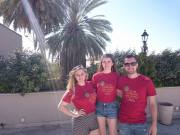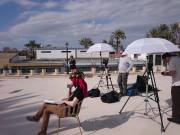INFORMATION PAGES for JAMES FITZMAURICE https://margaretcavendish.net/about/information-page-for-james-fitzmaurice/. Also James Fitzmaurice
MARGARET CAVENDISH AND VIRGINIA WOOLF VIDEO CLIP
Five minute video clip of “Cavendish, Woolf, and the Cypriot Goddess Natura,” a play performed for the Othello’s Isand Conference at the CVAR Museum in Nicosia on 7 April 2017. There is a link to the full video when the clip finishes.
The actors were students from the University of Sheffield and Sheffield Hallam University. The director was SHU Lecturer in Performance Dr Henry Bell. The video was shown at the International Margaret Cavendish Society meeting at Bates College in June of 2017. Script is at the open access Humanities Commons https://hcommons.org/ or from j.fitzmaurice@shef.ac.uk.
Margaret Cavendish, Virginia Woolf, and the Cypriot Goddess Natura
Programme Notes
During the middle years of the 17th century, Margaret Cavendish published poetry on scientific topics, plays that dealt with religion, and essays on philosophy. She also published a biography of her husband and her own autobiography. She was an extraordinary woman and a key figure among women intellectuals, including those who corresponded with the Dutch “virtuoso” scientist Sir Constantijn Huygens. Cavendish was sometimes an object of crude misogynistic jest while she lived, and 250 years later Virginia Woolf used an essay in the London Times (later reprinted in The Common Reader) to ridicule Cavendish’s literary production and marriage.
This play opens with two young women, a graduate student and a newly appointed museum curator, having coffee while speculating about Woolf’s understanding of and emotional involvement with Cavendish. Ridicule, yes, but also fascination. The two young women find themselves slowly being drawn into an imaginary exchange involving the two classic women writers as the café closes up for the evening.
The situation becomes increasingly strange when Woolf, herself, walks in and offers to talk about her writing practices. Before long, Cavendish joins the group, and then Huygens appears, bringing with him male perspectives and predilections. Huygens is followed by Beatrix Cusance, Duchess of Lorraine, who transforms the café into a salon, and by John Evelyn, the famous diarist. As the play closes, John’s wife, Mary (who does not approve of salon culture and who is a little upset), joins Margaret Cavendish for a discussion of the foibles of men.
Much silliness endemic to salons transpires but also a measure of serious consideration of modes of written discourse and of natural philosophy, or as one might say, the realm of the Cypriot goddess Natura.
NB – While this play is based for the most part on fact, many of the details are extrapolations or are simply imagined by the author.

Characters in Order of Appearance
Melissa – [Doubles with Elizabeth Chaplin and Mary Evelyn.] Entry-level museum curator specialising in Early Modern history. Interested in the ideas as well as the social circumstances of women intellectuals of the 17th century, including the thinking of Margaret Cavendish.] Emilie Philpott, University of Sheffield.
Male Barista – [Doubles with Constantijn Huygens.] A large, heavy-set man in his mid-40s. Tom Cable, University of Sheffield.
Female Barista – [Doubles with Virginia Woolf.] A slender woman of about the same age. Jessica Hakin, University of Sheffield.
Balthazar Café Customer – [Doubles with John Evelyn.] Appears briefly at the beginning of the play as part of the “atmosphere”. Jessica Brown, Sheffield Hallam University.
Joan – [Doubles with Beatrix Cusance.] Of slight build. PhD student in English working on Modernism and early 20th-century literature, in particular the writing of Virginia Woolf. Morgan Reilly, Sheffield Hallam University.
Margaret Cavendish – Early Modern woman writer, who was discovered by academia in the 1990s. Cavendish felt that God does not intercede in human affairs and that He leaves the ordering of the world to Nature, indeed, the Goddess Natura. Cavendish was from a family of wealthy commoners, but eventually became the Duchess of Newcastle. Lived in Antwerp during the Interregnum. Lucy Morehen, Sheffield Hallam University.
Virginia Woolf – [Doubles with Female Barista.] In addition to being recognized today as a major novelist and essayist of the 20th century, Woolf wrote that Cavendish was a “cucumber” choking out all the flowers in the garden of literature. Jessica Hakin, University of Sheffield.
Constantijn Huygens – [Doubles with Male Barista.] Philosopher and “virtuoso” Dutch scientist. Huygens maintained a large correspondence in several languages with socially prominent ladies. His letters to Margaret Cavendish have survived. Tom Cable, University of Sheffield.
Elizabeth Chaplain – [Doubles with Melissa.] Waiting lady and protégé to Margaret Cavendish. Emilie Philpott, University of Sheffield.
Beatrix de Cusance – [Doubles with Joan.] Beatrix, Duchess of Lorraine, established a fashionable salon near Brussels at Beersel Castle. Her husband had been married to another woman and had asked the Pope for an annulment. The Pope did not comply, so the second marriage, to Cusance, was considered bigamous by many and was something of a scandal. Probably knew Margaret Cavendish socially. Morgan Reilly, Sheffield Hallam University.
John Evelyn – [Doubles with the Café Customer.] Diarist, writer on various topics, and translator. Evelyn carried on a serious, but platonic relationship, with a much younger court lady. Knew Cavendish, with whom he exchanged gift copies of books. Jessica Brown, Sheffield Hallam University.
Mary Evelyn – [Doubles with Melissa.] Wife to John Evelyn. Mary thought that Cavendish was rude in speech and disliked John’s tendency to cultivate court beauties. Emilie Philpott, University of Sheffield.
Thanks for financial support to: The Alumni Association of the University of Sheffield, Sheffield Hallam University’s Department of Performance, and the Othello’s Island Conference. The Centre for Visual Arts and Research Museum provided acting space, and costumes were loaned by the English theatre group ACT as well as The Collective (vintage clothing shop, Palaion Patron Germanos 4-6, Nicosia 1010).



